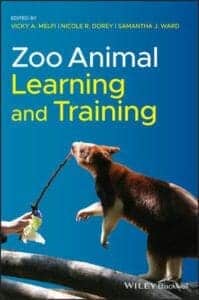
By Bethany L. Krebs and Jason V. Watters
A Guide to Managing Zoo Animal Welfare: A Behavioral Approach delivers a step-by-step guide to behavioral assessment approaches, techniques, and tools for animal welfare with an emphasis on animals living in zoos and aquaria. The authors develop a unique “balance-based” approach that can be used to assess and enhance the welfare of a diverse range of species. Backed by extensive scientific literature, this book also provides foundational context to help readers to understand why the authors give these recommendations and guidelines.
Features
- Proximate and ultimate reasoning for the existence of each of the Needs
- Welfare benefits of meeting the Needs, including positive affect, maintaining homeostasis, passing on genes, and learning through reinforcement
- The highly variable personalities of individual animals and different animal species, as well as why personality is an important facet of animal welfare
- A guide for assessing animal welfare using the Three Needs model
Table of Contents
- Background Concepts and Goals
- Is Wild Animal Behavior a Proper Template for Captive Animal Behavior?
- Investigating
- Acquiring Reward
- Exerting Control
- Balance: Good Welfare Through Psychological Resilience
- Animal Personality: For Every Animal, All Needs Are Important, but They Are Not Equal
- What It Looks Like When the Needs Are Met and Not Met
- Assessment: Asking Animals, “Are Your Needs Met?”
- A Practitioner’s Guide to Meeting the Needs
- Exceptional Cases:
- Geriatric Animals
- Chronically and Acutely Ill Animals
- Injured Animals
- Scenarios















![Ettinger’s Textbook of Veterinary Internal Medicine 9th Edition [PDF+Videos] Ettinger’s Textbook of Veterinary Internal Medicine 9th Edition [True PDF+Videos]](https://www.vet-ebooks.com/wp-content/uploads/2024/10/ettingers-textbook-of-veterinary-internal-medicine-9th-edition-100x70.jpg)

![Textbook of Veterinary Diagnostic Radiology 8th Edition [PDF+Videos+Quizzes] Thrall’s Textbook of Veterinary Diagnostic Radiology, 8th edition PDF](https://www.vet-ebooks.com/wp-content/uploads/2019/09/textbook-of-veterinary-diagnostic-radiology-8th-edition-100x70.jpg)






